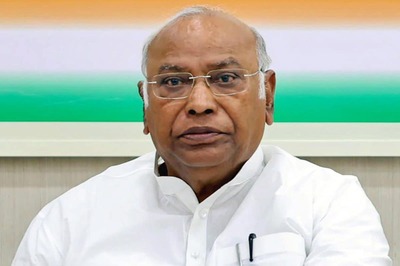
views
Tokyo: Asian shares fell on Wednesday, with Tokyo's Nikkei shedding more than 1 per cent, and oil rose as investors worried about Japan's nuclear crisis in Japan, violence in Libya and unrest in the Middle East.
The euro hovered below a 4-1/2-month high as worries about debt problems in Portugal and Ireland halted its recent gains, while the yen hugged a tight range near 81 to the dollar amid caution about further central bank intervention.
Portugal's parliament was due to vote on the minority Socialist government's latest austerity measures on Wednesday, with Prime Minister Jose Socrates threatening to resign if the opposition rejects the proposals.
Japan's Nikkei fell 1.6 per cent as investors took profits from a two-session bounce. Japanese stocks remain around 8 per cent below their close on March 11, the day northeast Japan was struck by a 9.0 magnitude earthquake and 10-metre tsunami.
The disaster left more than 21,000 people dead or missing, crippled a nuclear power plant that has been leaking radiation and hit production at major companies such as Sony Corp and Toyota Motor.
"It's not that the market is ignoring fundamentals," said Takashi Hiroki, chief strategist at Monex Inc.
"We just simply don't know them yet, as many companies are still gathering information about damage sustained during the disasters."
MSCI's broadest index of Asia-Pacific shares outside Japan fell 0.3 per cent, mirroring falls on Wall Street, where the Dow Jones industrial average lost 0.2 per cent and the S&P 500 fell 0.4 per cent.
"It's fairly evident that while we have had added strength in our market, there is still caution out there, with the view that markets are not going to race up in any great hurry," said Jamie Spiteri, senior dealer at Shaw Stockbroking in Australia.
Uncertainty about the nuclear disaster and the final human and economic cost of the earthquake and tsunami supported Japanese government bonds, with benchmark 10-year futures rising 0.30 point to 139.70, which the 10-year yield
The incident is likely to slow Japan's economic growth, so markets are expected to factor this in," said Akito Fukunaga, chief fixed-income strategist at RBS Securities.
"I think the influence of the economic slowdown surpasses worries over Japan's fiscal position in the JGB markets."
The euro traded around $1.4165 , off a four-month high near $1.4250 reached on Tuesday.
"If Prime Minister Socrates steps down, Portugal will likely ask the European Union and the IMF for help, which is likely to trigger a bit of euro selling," said Junya Tanase, chief strategist at JPMorgan Chase Bank in Tokyo.
Also weighing on the euro were rumours that Allied Irish Banks, which has been effectively nationalised, was planning to miss a coupon payment, driving the premium that investors demand to hold Irish 2-year bonds to a euro-era high.
AIB said in a statement it would pay the coupon due on Wednesday as scheduled.
The yen remained little moved over the past 24 hours, with traders wary the Bank of Japan might step in again if the dollar falls below 80.50, following Friday's rare market intervention by leading central banks to curb the currency's strength.
Last week, expectations the cost of quake reconstruction would prompt insurance firms and others in Japan - a big net creditor to the rest of the world - to repatriate yen drove the Japanese currency to a record 76.25 per dollar before the Group of Seven launched the first coordinated intervention since 2000.
Oil crept higher, as fighting in producer Libya and unrest in Yemen fuelled worries of supply disruptions.
US crude was up 0.2 per cent at $105.15 a barrel and Brent crude gaining 0.4 per cent to $116.14. Spot gold was steady around $1,428.50 an ounce.




















Comments
0 comment